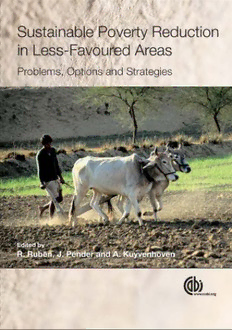
Sustainable poverty reduction in less-favoured areas PDF
Preview Sustainable poverty reduction in less-favoured areas
SUSTAINABLE POVERTY REDUCTION IN LESS-FAVOURED AREAS This page intentionally left blank S P USTAINABLE OVERTY R EDUCTION IN L - A ESS FAVOURED REAS Edited by R. Ruben Centre for International Development Issues Nijmegen (CIDIN), Radboud University, Nijmegen, The Netherlands J. Pender International Food Policy Research Institute (IFPRI), Washington DC, USA and A. Kuyvenhoven Development Economics Group, Wageningen University, Wageningen, The Netherlands CABI is a trading name of CAB International CABI Head Office CABI North American Office Nosworthy Way 875 Massachusetts Avenue Wallingford 7th Floor Oxfordshire OX10 8DE Cambridge, MA02139 UK USA Tel: +44 (0)1491 832111 Tel: +1 617395 4056 Fax: +44 (0)1491 833508 Fax: +1 617354 6875 E-mail: [email protected] E-mail: [email protected] Website: www.cabi.org ©CAB International 2007. All rights reserved. No part of this publication may be reproduced in any form or by any means, electronically, mechanically, by photocopying, recording or otherwise, without the prior permission of the copyright owners. Acatalogue record for this book is available from the British Library, London, UK. ISBN 978 1 84593 2770 Library of Congress Cataloging-in-Publication Data Sustainable poverty reduction in less-favoured areas / edited by Ruerd Ruben, John Pender and Arie Kuyvenhoven. p cm. Includes bibliographical references and index. ISBN 978-1-84593-277-0 (alk. paper) -- ISBN 978-1-84593-278-7 (ebook) 1. Sustainable development--Developing countries. 2. Agricultural development projects--Developing countries. 3. Rural development-- Developing countries. 4. Poverty--Developing countries. I. Ruben, Ruerd. II. Pender, J. III. Kuyvenhoven, Arei. IV. Title. HC59.72.E5S885 2007 339.4(cid:1)6091724--dc22 2007006344 The paper used for the text pages in this book is FSC certified. The FSC (Forest Stewardship Council) is an international network to promote responsible management of the world’s forests. Typeset by Columns Design Ltd, Reading, UK Printed and bound in the UK by Cromwell Press, Trowbridge Contents Contributors ix 1 Sustainable Poverty Reduction in Less-favoured Areas: 1 Problems, Options and Strategies Ruerd Ruben, John Pender and Arie Kuyvenhoven Part I: Development Strategies for Poor People in Less-favoured 63 Areas 2 Designing and Evaluating Alternatives for More Sustainable 65 Natural Resource Management in Less-favoured Areas Santiago López-Ridaura, Herman van Keulen and Ken E. Giller 3 Dimensions of Vulnerability of Livelihoods in Less-favoured 91 Areas: Interplay Between the Individual and the Collective Johan Brons, Ton Dietz, Anke Niehof and Karen Witsenburg 4 Market Imperfections 111 Nazneen Ahmed, Jack Peerlings and Aad van Tilburg Part II: Resource Management Options 133 5 Soil Nutrient Dynamics in Integrated Crop–Livestock 135 Systems in the Northern Ethiopian Highlands Assefa Abegaz and Herman van Keulen 6 Rural Development and Sustainable Land Use in the Hillsides 159 of Honduras Hans G.P. Jansen, John Pender, Amy Damon, Willem Wielemaker and Rob Schipper v vi Contents 7 Resource Use Efficiency on Own and Sharecropped Plots in 181 Northern Ethiopia: Determinants and Implications for Sustainability Girmay Tesfay, Ruerd Ruben, John Pender and Arie Kuyvenhoven Part III: Livelihoods and Food Security 203 8 Food Security Through the Livelihoods Lens: an Integrative 205 Approach Julieta R. Roa 9 Changing Gender Roles in Household Food Security and Rural 228 Livelihoods in Bangladesh Ahmed Ali and Anke Niehof 10 Does Social Capital Matter in Vegetable Markets? The Social 248 Capital of Indigenous Agricultural Communities in the Philippines: Socio-cultural Implications and Consequences for Local Vegetable Trade Aimee Milagrosa and Louis Slangen Part IV: Markets and Institutional Development 271 11 Making Markets Work for the Poor: the Challenge in the Age 273 of Globalization Eleni Z. Gabre-Madhin 12 Market Access, Agricultural Productivity and Allocative 301 Efficiency in the Banana Sector of Uganda Fred Bagamba, Kees Burger, Ruerd Ruben and Arie Kuyvenhoven 13 Land and Labour Market Participation Decisions under 328 Imperfect Markets: a Case Study in North-east Jiangxi Province, China Shuyi Feng, Nico Heerink and Ruerd Ruben 14 Land and Labour Allocation Decisions in the Shift from 354 Subsistence to Commercial Agriculture Moti Jaleta and Cornelis Gardebroek 15 Effects of Deregulation of the Rice Market on Farm Prices in 375 China: a Marketing Channel Model Le Chen and Jack Peerlings 16 Consequences of the Abolition of the Multi-fibre Arrangement 397 Import Quotas on the Apparel Industry of Bangladesh: a Computable General Equilibrium Analysis Nazneen Ahmed and Jack Peerlings Contents vii Part V: Strategies and Policy Priorities 419 17 Poverty Targeting with Heterogeneous Endowments: a 421 Micro-simulation Analysis of a Less-favoured Ethiopian Village Marijke Kuiper and Ruerd Ruben 18 Less-favoured Areas: Looking beyond Agriculture towards 442 Ecosystem Services Leslie Lipper, Prabhu Pingali and Monika Zurek 19 Livelihood Strategies, Policies and Sustainable Poverty 461 Reduction in LFAs: a Dynamic Perspective Andrew Dorward Index 467 This page intentionally left blank Contributors Assefa Abegaz is Professor at Mekelle University, Ethiopia, and has conducted research within the framework of the Wageningen University/IFPRI research programme on less-favoured areas. Nazneen Ahmed is a Research Fellow at the Bangladesh Institute for Development Studies (BIDS) and has conducted research within the framework of the Wageningen University/IFPRI research programme on less-favoured areas. Ahmed Ali is a staff member of the Bangladesh Rural Advancement Committee (BRAC) and has conducted research within the framework of the Wageningen University/IFPRI research programme on less-favoured areas. Fred Bagamba is a Researcher at the Banana Research Institute, Uganda, and has conducted research within the framework of the Wageningen University/IFPRI research programme on less-favoured areas. Johan Brons is a Researcher at the Development Economics Group, Department of Social Sciences, Wageningen University, Netherlands. Kees Burgeris Associate Professor at the Development Economics Group, Department of Social Sciences, Wageningen University, Netherlands. Le Chen is a Researcher from Nanjing Agricultural University, China, and has conducted research within the framework of the Wageningen University/IFPRI research programme on less-favoured areas. Amy Damon is a Researcher at the Department of Applied Economics, University of Minnesota, USA. Ton Dietz is Professor in Human Geography at the Amsterdam Institute for Metropolitan and International Development Studies (AMIDSt), ix
